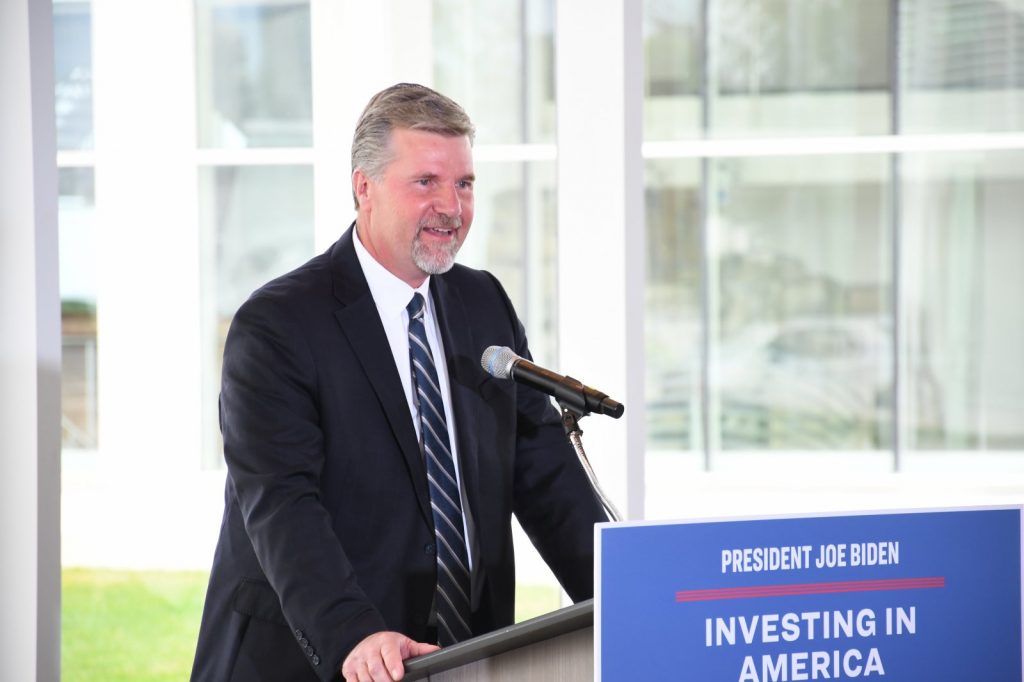DNR Secretary Payne Resigns After Just 10 Months
Cites personal reasons as agency faces debates over wolf management, PFAS pollution.
Wisconsin Department of Natural Resources (DNR) Secretary Adam Payne submitted his resignation Friday to Gov. Tony Evers. The resignation, effective at the end of the day on Nov. 1, will leave the environmental agency without someone in its top post as it deals with the finalization of its proposed plan for managing the state’s wolf population and continued negotiations with Republican legislators over a bill to address PFAS contamination across the state.
“It is with a heavy heart that I inform you that I provided the attached letter of resignation to the governor’s office,” Payne wrote Monday in an email to environmental groups, obtained by the Wisconsin Examiner.
Payne was appointed as secretary earlier this year, following a two-decade career as the Sheboygan County administrator.
“The past year has been a whirlwind, and we certainly accomplished a lot,” the email continued. “I am so grateful for your leadership, expertise, kindness, and support. We are blessed to have a strong leadership team in place, and so many thoughtful, talented, and passionate co-workers. It was truly an honor to serve with you and be a part of doing such honorable work.”
Payne said he’d admired the DNR since childhood, and that his time at the agency has strengthened that appreciation. “Thank you for all that you have done and continue to do to protect and enhance our natural resources and help people and communities be safe and successful,” it concluded.
In his resignation letter to Evers, Payne called his departure “bittersweet,” saying he wants to spend time with his aging parents after his more than 24 years of public service. “All the best to you, your family and administration,” the letter concluded. “I am grateful for your leadership and friendship.”
Neither Payne nor Evers responded to requests for comment from the Examiner on Monday evening.
In his letter to Evers, Payne pointed to various administration actions for which he was grateful, including “the historic investment in our state park system” in the state budget, “the start of the clean-up and restoration of of the Milwaukee Estuary — a tremendous example of collaboration,” and, “after two decades, the development of a new wolf management plan.”
Wolf controversy
Payne’s announcement comes just days before the state’s Natural Resources Board is set to consider adopting a new wolf management plan at a meeting on Wednesday. The plan has prompted heated debate over the agency’s decision to forgo setting a numerical population goal for wolves in the state.
Instead of setting a target number, the plan divides the state into zones from which decisions to manage the population can be made based on biological carrying capacities of the zones. Estimates put the current wolf population in Wisconsin at around 1,000.
As part of the opposition to the DNR-proposed plan, Republican lawmakers have been advancing a bill that would require the agency to set a specific population number. The bill passed the Senate on a party-line vote and is awaiting a vote in the Assembly.
In addition to the controversy over wolf management, the DNR is also in the midst of negotiations over a Republican-authored bill to address PFAS contamination in water across the state.
PFAS negotiations
In his resignation letter to Evers, Payne wrote, “I was particularly grateful the budget provided additional resources that will help us respond more effectively to water pollution, including PFAS, nitrates, phosphorus, and lead, and for the $125 million put into a trust fund to help people and communities in need combat PFAS.”
PFAS are man-made compounds used in a variety of products from firefighting foam to non-stick wrappers and cookware. The compounds are called “forever chemicals” because they typically do not break down in the environment. Numerous diseases in both humans and animals including cancers, birth defects, and thyroid disorders have been linked to PFAS exposure.
The Republican PFAS bill, which has drawn criticism from environmental groups, passed committee and is set to advance to the Senate floor.
The bill is the vehicle through which $125 million set aside in the state budget would be spent on programs to help municipalities cover the costs of additional treatment and aid individual property owners in fixing contaminated drinking wells. But it also includes provisions that limit the DNR’s authority to enforce remediation.
Environmental groups and legislative Democrats say the bill undermines the state’s spills law, which grants the DNR authority to hold individuals accountable for pollution, since the new measure prohibits the DNR from taking enforcement actions against some landowners.
Despite the objections, the bill’s Republican authors have said the measure is the result of compromise with the DNR and reflects the realities of divided government.
Soon after taking the job with the start of Evers’ second term in January, Payne said he was excited about the prospect of addressing the state’s most pressing environmental and conservation concerns while working with people of all points of view.
“The neat thing about the DNR is — though you have all these different factions and yes, it can be controversial and we’re all gonna take our share of bullets from time to time — it’s also, I think, it’s a pretty cool challenge to be able to work with so many different entities and stakeholders and learn from them and just grow from their different points of view and their cultures and their background and then try to piece it together and build consensus and at the end of the day, do what’s right for our environment and the people that rely on it,” Payne told the Examiner in January.
Wisconsin DNR Secretary Payne resigns after 10 months on the job was originally published by the Wisconsin Examiner.
More about the PFAS Problem
- PFAS Levels in Great Lakes Fish Are Dropping - Danielle Kaeding - Feb 6th, 2026
- Gov. Evers and GOP Lawmakers Near a Deal on PFAS Pollution - Danielle Kaeding - Jan 22nd, 2026
- Gov. Evers Optimistic About Reaching Final Deal With Republican Lawmakers to Secure Release of $125 Million in Long-Awaited Pfas Investments - Gov. Tony Evers - Jan 21st, 2026
- Bipartisan Push to Tell Counties Faster When Water Tests Fail - Henry Redman - Dec 19th, 2025
- MKE County: County Seeks to Sue PFAS Producers, Oil Companies - Graham Kilmer - Dec 10th, 2025
- Wisconsin Reviewing EPA-Approved Pesticides For PFAS - Danielle Kaeding - Dec 9th, 2025
- State Nears Settlement with Johnson Controls/Tyco Over PFAS Spills - Danielle Kaeding - Dec 4th, 2025
- Senate Bill Promotes Soybean-Based Firefighting Foam to Replace PFAS - Danielle Kaeding - Dec 2nd, 2025
- Test Results Show High PFAS Levels in Wisconsin’s Landfill Runoff - Danielle Kaeding - Dec 2nd, 2025
- Wisconsin Communities Get $282 Million for Drinking Water Projects - Danielle Kaeding - Nov 19th, 2025
Read more about PFAS Problem here





















